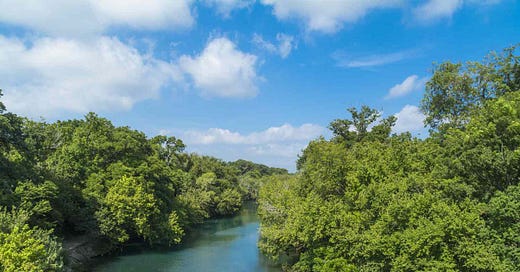Dear Stakeholders,
Last week’s meeting began with an introduction of Dr. Katie Kaplan, who will be working with BCarbon and Rice University over the next six months on dMRV for nature-based carbon projects. Katie has a PhD in Applied Ecology from Cornell University and an extensive background in data science and marine conservation, having worked with groups including Meta, Spotify, and California Department of Fish and Wildlife. She is most recently the founder of Next Wave Carbon.
Next up, we welcomed Audrey Barrett Bixler, Environmental Markets Director at Arva, for a presentation on insetting and the voluntary carbon market. She walked us through Arva’s end-to-end model for sustainable agriculture, which aggregates data from farmers and ranchers. Their system helps to quantify the benefits of sustainable agricultural practices and bring profit back to producers on the ground.
After that, Lauren Miller, Director of Voluntary Carbon Markets at Gevo, spoke about supply chains and carbon intensity assessment. A carbon intensity (CI) score measures the greenhouse gas emissions released through the life cycle of producing a unit of product. Lauren discussed how Gevo tracks the carbon intensity of biofuels and breaks it down by emissions and soil organic content changes. This process allows biofuel production data to be monitored in real time to reduce CI.
Thanks, Audrey and Lauren, for two great presentations that sparked a lot of productive discussion. You can see both of their slide decks in the compiled PDF towards the end of this message.
BCarbon’s own James FitzGerald, Sarah Swackhamer, and Emmanuel Ellerbee then provided updates on the progress of BCarbon’s Small Landowner Carbon Collaborative, a partnership with Prairie View A&M Extension and the US Business Council for Sustainable Development funded by the Bia-Echo Foundation. The project aims to develop a co-op of small-acreage forest landowners who can pool their resources to improve access to markets for carbon and forest products. It involves landowner outreach, education, and methodological and legal research. Its underlying objective is to reduce smallholder land loss by bringing new revenue streams to underserved landowners, predominantly African American forest owners in East Texas.
Sarah and Emmanuel spoke about our extensive community outreach and site visits over the last six months, as well as the connections we have built with landowners and expert advisors, such as the Federation of Southern Co-Operatives and the Texas A&M Forest Service. In Year 2, our goal is to work with a pilot group of 10-15 of our participating landowners on carbon MRV and co-op formation.
Those interested in the project can check out the intro for our carbon market video series, which we created as an educational resource for landowners. You can also view our project website for the full set of videos and their accompanying newsletters, which include in-depth explanations of key terms and concepts. If you’d like to donate to support the case study and/or pilot project work we’re doing, please contact us!
After that, BCarbon Technical Operations Director Miguel Gonzalez gave some updates on new carbon market trends and regulations. He began by speaking about potential changes at the Science Based Targets Initiative (SBTi), which is tasked with defining emissions reduction practices and validating companies’ targets as science-based. SBTi currently excludes the use of carbon offsets. Last September, SBTi issued a call for evidence and public comments on the use of carbon offsets and indicated that it would extend the use of carbon credits beyond the current limits. However, this announcement prompted staff backlash against the CEO and Board of Directors, and it is unclear whether SBTi policy toward offsets will in fact change. SBTi aims to issue a draft of basic rules, thresholds, and guardrails for the potential use of carbon credits and other “Environmental Attribute Credits” (EACs) by this July.
We ended the meeting with some closing remarks from our CEO Jim Blackburn, who emphasized the potential of our SLCC project to make change in the market. He also previewed some of our thinking for the next full-group meeting, which will be on July 11th. One likely topic will be the persistent challenge of additionality and the work we’re doing on the concept with a coalition of like-minded organizations. More on this to come!
You can view the compiled slides from the meeting below:
Upcoming Meetings:
Next full group meeting: July 11th at 9 AM CT
Insurance subcommittee: June 13th, 10 AM CT. This meeting of the insurance subcommittee will be focused on forest carbon market/credit insurance, with a guest presentation from Oka. If you’re interested in joining, please let us know!
To be added to any meeting, please contact Sarah (Sarah.Swackhamer@BCarbon.org).
You can also access our upcoming schedule any time on our website’s events page. As always, if you have questions, comments, ideas, or concerns, please feel free to email, call, text, or set up a Zoom.
Thanks for your ongoing support and guidance. Wishing you a rejuvenating start to the summer!
BCarbon



